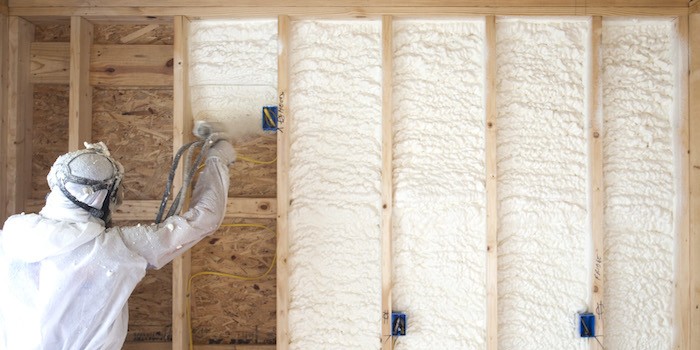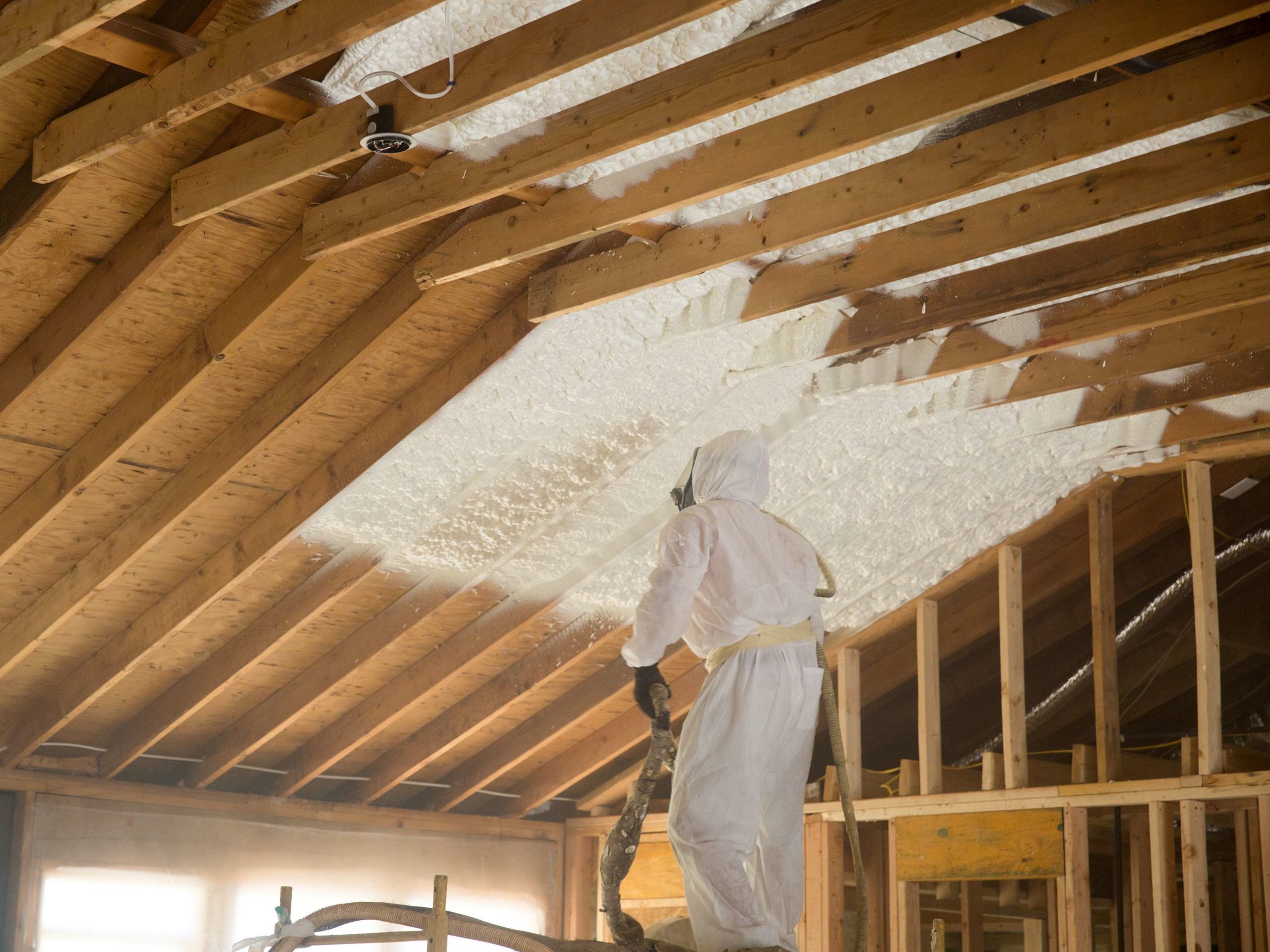Spray Foam: The Ultimate Option for Air Sealing and Insulation
Spray foam insulation has arised as a leading remedy for reliable air securing and thermal insulation, providing a distinct combination of homes that set it apart from traditional approaches. Recognizing the complete scope of its benefits, installment procedures, and comparisons with various other insulation kinds is important for making notified decisions.
What Is Spray Foam?
Spray foam is a functional insulation product that combines the concepts of air securing and thermal resistance to enhance power effectiveness in structures. Made up mainly of polyurethane or other comparable compounds, spray foam is used as a fluid that expands upon call with surfaces, creating a strong, continuous layer of insulation. This one-of-a-kind property permits it to fill voids, fractures, and voids that typical insulation materials might neglect, providing a remarkable air seal.
There are two major types of spray foam: open-cell and closed-cell. Open-cell spray foam is lighter and more versatile, offering exceptional sound absorption and a lower R-value per inch - Spray Foam. In contrast, closed-cell spray foam is denser, offering a greater R-value, dampness resistance, and added architectural integrity to constructing components
The application procedure usually entails specialized tools, ensuring a smooth application that sticks to various substratums, consisting of concrete, steel, and wood. This versatility makes spray foam ideal for both new buildings and retrofitting existing frameworks. Its ability to produce an impermeable obstacle considerably adds to lowering energy consumption and enhancing interior air quality, thus making it a preferred choice among building contractors and property owners alike.
Advantages of Spray Foam Insulation
One of the most considerable advantages of spray foam insulation is its phenomenal ability to create a constant air barrier, which successfully decreases power loss. Unlike typical insulation products, spray foam increases to load gaps and cracks, ensuring that air leakage is considerably minimized. This particular not just enhances energy effectiveness however likewise causes decrease energy costs gradually.
In addition, spray foam insulation gives superior thermal resistance, adding to a more secure indoor environment. Its high R-value per inch permits effective insulation in confined spaces, making it optimal for attic rooms, walls, and crawl areas. In addition, the moisture-resistant residential properties of spray foam aid protect against mold and mildew and mold development, advertising much healthier living problems.
Another critical advantage of spray foam insulation is its sound-dampening qualities (Spray Foam). It effectively reduces noise transmission in between rooms, producing a quieter and a lot more comfortable home environment. The longevity of spray foam additionally stands out, as it does not droop or settle in time, preserving its efficiency throughout its life-span
How Spray Foam Functions
Understanding just how spray foam insulation works is crucial for appreciating its performance in air sealing and thermal resistance. Spray foam insulation is composed of two main parts: isocyanate and polyol resin. When these elements are combined, they undergo a chemical response that causes the material to increase rapidly, producing a thick foam that fills cracks, tooth cavities, and voids.
As the foam broadens, it abides by surface areas, forming a closed seal that substantially lowers air infiltration. This characteristic makes spray foam insulation extremely efficient at protecting against drafts and moisture penetration, which can result in power loss and damages with time. Additionally, the closed-cell variation of spray foam uses premium thermal resistance as a result of its inflexible framework, effectively reducing warm transfer.
The distinct residential or commercial properties of spray foam enable it to adapt irregular surfaces, making sure detailed protection and a seamless barrier. Consequently, spray foam insulation not only enhances power performance yet additionally adds to enhanced indoor air high quality by decreasing the accumulation of toxins and irritants. Eventually, understanding the mechanics behind spray foam underscores its duty as a remarkable option for insulation and air sealing in both article source residential and commercial applications.
Setup Refine Introduction

Prior to installment, the space needs to be adequately cleaned up and prepped, making certain that surfaces are without moisture, debris, and dust. Because pollutants can jeopardize bond and general efficiency, this action is critical. Once the area is prepared, the application involves mixing the two components of the spray foam, which broadens upon get in touch with and fills up spaces successfully.
Educated specialists need to perform the installment, making use of customized tools resource to make certain consistent insurance coverage and optimum thickness. Safety and security preventative measures, consisting of putting on safety equipment and making sure appropriate ventilation, are necessary throughout this process. After application, the foam usually remedies rapidly, forming a solid obstacle that boosts power effectiveness.
Comparing Spray Foam to Traditional Insulation
When evaluating insulation alternatives, spray foam insulation stands out in comparison to typical products such as fiberglass and cellulose. Unlike fiberglass and cellulose, which can allow air seepage, spray foam increases upon application, loading crevices and gaps to develop a closed seal.
Additionally, spray foam provides a greater R-value per inch than traditional insulation types, supplying more effective thermal resistance in a thinner profile. This particular is particularly useful in rooms with limited dental caries deepness. In addition, spray foam is resistant to wetness and mold growth, which can be a substantial worry about cellulose and fiberglass, particularly in damp atmospheres.
Nonetheless, spray foam insulation generally lugs a higher ahead of time cost than its standard equivalents. Property owners need to consider this initial investment against lasting energy savings and performance advantages. Inevitably, while both insulation kinds offer their objective, spray foam arises as an advanced option for contemporary insulation demands, specifically in terms of air sealing and thermal efficiency.

Final Thought
In summary, spray foam insulation represents an extremely efficient service for accomplishing optimal air sealing and thermal resistance. Its unique homes, including moisture resistance and sound read this article dampening, make it ideal for numerous applications in both brand-new buildings and retrofitting projects (Spray Foam). The first expenses may be greater compared to traditional insulation products, the long-lasting benefits, such as substantial energy financial savings and enhanced indoor air top quality, validate the investment and emphasize its value in modern-day building techniques.
Spray foam insulation has actually emerged as a leading option for effective air securing and thermal insulation, providing an unique mix of homes that establish it apart from traditional methods.Spray foam is a functional insulation material that incorporates the principles of air securing and thermal resistance to enhance energy performance in buildings.When reviewing insulation choices, spray foam insulation stands out in contrast to conventional products such as fiberglass and cellulose. Ultimately, while both insulation types offer their purpose, spray foam arises as an extra sophisticated remedy for modern insulation requirements, specifically in terms of air sealing and thermal effectiveness.
In recap, spray foam insulation represents an extremely reliable solution for accomplishing optimum air securing and thermal resistance.